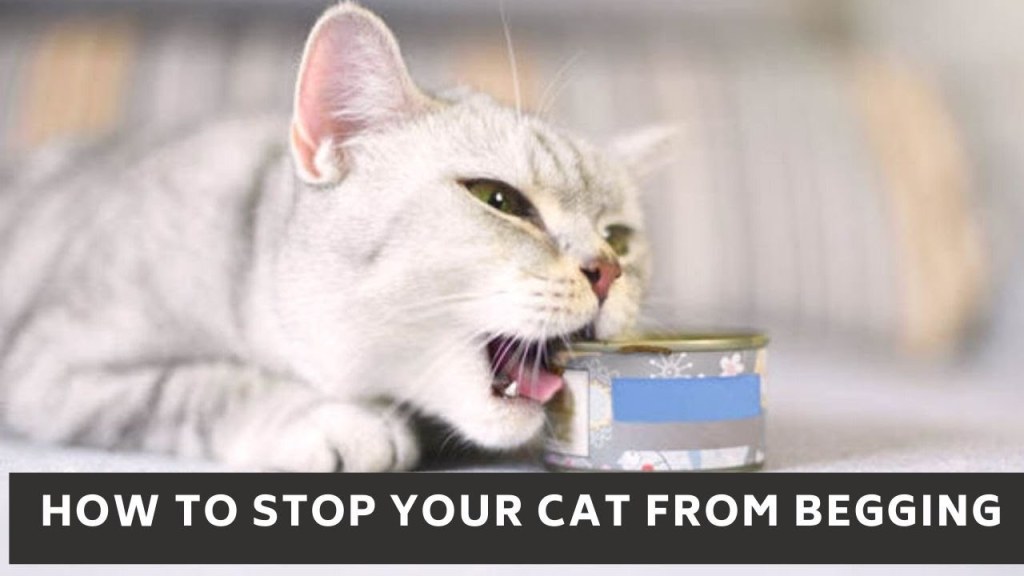Say Goodbye To Your Cat’s Table Food Begging With These Simple Tricks!
How to Stop Your Cat from Begging for Table Food
Introduction
Dear Cats Lover,
Are you tired of your cat constantly begging for table food? Do you find it challenging to enjoy a meal without your furry friend giving you those irresistible pleading eyes? You’re not alone. Many cat enthusiasts struggle with this issue. In this article, we will explore effective strategies to put an end to your cat’s begging behavior, ensuring a harmonious mealtime for both you and your feline companion.
2 Picture Gallery: Say Goodbye To Your Cat’s Table Food Begging With These Simple Tricks!


Now, let’s delve into the details and discover how you can establish healthy boundaries with your cat when it comes to table food.
What is Table Food Begging?
Table food begging refers to the behavior exhibited by cats when they constantly seek human food during mealtime. This can include meowing, pawing at your leg, jumping on the table, or giving you those irresistible puppy eyes. While it may seem cute, it can become a nuisance and lead to unhealthy eating habits and obesity in cats.
Who is Affected by Table Food Begging?

Image Source: shopify.com
Table food begging can affect any cat owner, regardless of their cat’s age or breed. Cats are intelligent creatures and quickly learn how to manipulate their owners to get what they want. Whether you have a mischievous kitten or a mature cat, it’s essential to address this behavior early on to prevent it from becoming a long-term habit.
When Does Table Food Begging Occur?
Table food begging can happen at any time, but it often occurs during mealtime when your cat sees you eating. Cats have a keen sense of smell and can detect the aroma of food from a distance. They may also exhibit begging behavior when they see you preparing food or notice food on the counter. Understanding the triggers for your cat’s begging can help you effectively address the issue.
Where Does Table Food Begging Happen?
Table food begging can happen anywhere your cat has access to you during mealtime. It could be at the dining table, kitchen counter, or even when you’re eating on the couch. Cats are opportunistic and will take advantage of any situation to get your attention and a taste of your food.
Why Do Cats Beg for Table Food?
Cats beg for table food for several reasons. Firstly, they are instinctively attracted to the smell and taste of human food. Additionally, cats are highly social creatures and want to be involved in whatever their human companions are doing. This includes mealtime, where they see you enjoying food and want to be a part of the experience. Lastly, cats may beg for table food if they have developed a habit of receiving treats or scraps from previous instances of begging.
How Can You Stop Your Cat from Begging for Table Food?

Image Source: ytimg.com
Stopping your cat from begging for table food requires patience, consistency, and positive reinforcement. Here are some effective strategies to help you address this behavior:
Establish a designated feeding area: Create a separate space for your cat’s meals, away from where you eat. This will help them understand that they have their own food and discourage them from begging for yours.
Stick to a regular feeding schedule: Cats thrive on routine. By feeding your cat at consistent times, they will come to expect their meals and be less likely to beg for table food.
Feed your cat before your meal: If your cat is hungry during your mealtime, they are more likely to beg for food. Ensure your cat is fed and satisfied before you sit down to eat.
Ignore begging behavior: Cats often beg for attention as much as they do for food. If your cat starts to beg, calmly ignore their behavior and avoid making eye contact or engaging with them.
Provide alternative distractions: Keep your cat entertained during mealtime by providing them with toys or interactive puzzles. This will redirect their focus away from your food and onto something more stimulating.
Use positive reinforcement: Reward your cat with praise or treats when they exhibit good behavior during mealtime. This will reinforce their understanding that begging is not rewarded, but good manners are.
Consult with a veterinarian: If your cat’s begging behavior persists or becomes excessive, it’s essential to seek guidance from a veterinarian. They can rule out any underlying medical conditions that may be contributing to the behavior and provide specific advice tailored to your cat’s needs.
Advantages and Disadvantages of Stopping Cat Begging
Advantages:
Improved eating habits: By preventing your cat from begging for table food, you can ensure they maintain a balanced diet and avoid consuming potentially harmful foods.
Better weight management: Table food begging can lead to obesity in cats. By stopping this behavior, you can help your cat maintain a healthy weight and reduce the risk of associated health issues.
Enhanced mealtime experience: Enjoying a meal without your cat begging for food can create a more pleasant and relaxed atmosphere for both you and your cat.
Disadvantages:
Initial resistance from your cat: Your cat may initially resist the new boundaries and continue begging for table food. It’s important to stay consistent and patient during this transition period.
Additional effort and time: Implementing strategies to stop cat begging requires time and effort on your part. Consistency and dedication are key to achieving long-term success.
FAQs
1. Can I give my cat any table food?
No, it’s best to avoid giving your cat table food altogether. Many human foods can be toxic to cats, including chocolate, onions, garlic, grapes, and raisins. Stick to a balanced diet of cat-specific food to ensure their health and wellbeing.
2. How long will it take for my cat to stop begging for table food?
The time it takes for your cat to stop begging for table food will vary depending on their personality and previous reinforcement. It can take several weeks or even months of consistent training and reinforcement for the behavior to diminish.
3. What if my cat continues to beg despite my efforts?
If your cat continues to beg for table food despite your efforts, it’s important to remain patient and consistent. Seek guidance from a veterinarian or professional animal behaviorist who can provide additional strategies tailored to your cat’s specific needs.
4. Can I ever treat my cat with human food?
While it’s best to avoid giving your cat human food, there are certain cat-safe options you can offer as an occasional treat. These include cooked chicken or fish without seasoning. However, moderation is key, and these treats should not replace their regular cat food.
5. Will stopping table food begging affect my bond with my cat?
No, stopping table food begging will not negatively impact your bond with your cat. In fact, it can strengthen your relationship by establishing boundaries and promoting a healthier lifestyle for your feline companion.
Conclusion
In conclusion, putting an end to your cat’s begging for table food is essential for their health and your mealtime enjoyment. By implementing the strategies outlined in this article, such as establishing a designated feeding area, providing alternative distractions, and using positive reinforcement, you can create a peaceful dining experience for both you and your cat. Remember to be patient, consistent, and seek professional guidance if needed. Together, you and your cat can overcome this behavior and foster a strong and loving bond.
Final Remarks
Disclaimer: The information provided in this article is for educational purposes only and should not replace professional advice. If you have any concerns about your cat’s health or behavior, please consult with a veterinarian or qualified animal behaviorist.
This post topic: Cats



